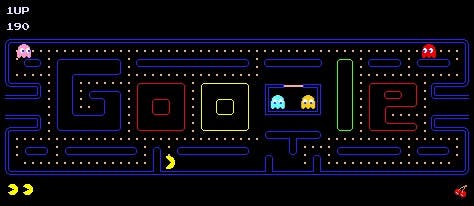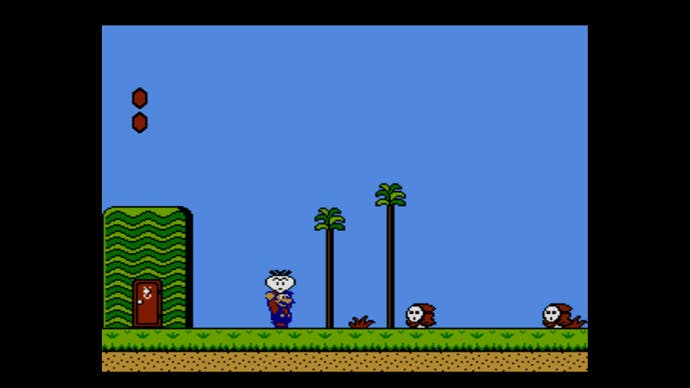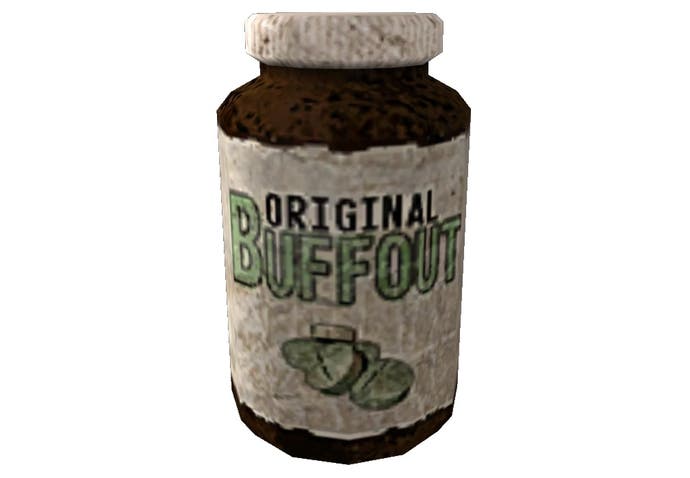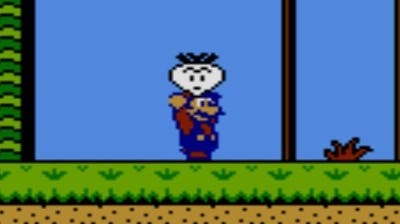A brief history of drug use in video games
Tripping meatballs from Mario to Cyberpunk.
"Come on. Lighten up. Have a whiff."
It's late into Cyberpunk 2077's demo when Dum-Dum extends a claw toward V, offering a hit from a skull-adorned inhaler. Perhaps sensing the veiled hostility behind the supposed peace pipe being thrust under her nose, she obliges. Arachnid eye implants shine through a red haze. Dum-Dum takes his own hit, and flared nerves settle. Between all the talk of cred chips and bots, the tension that fuels this choice stems from a ritual as old as time. Breaking bread. Chinking cups. Passing the proverbial Dutchie to the left.
Adult games, as a medium, are often enamoured with their own portrayal of taboo subjects, but there's a streak of silently judgemental conservatism dulling the libertine sheen. By confining their use to grim settings, these stories condemn altered states of consciousness as the territory of society's dregs. At the same time, they're perfectly happy to hijack their aesthetics when it suits. Unexamined praise can be as useless as uninformed panic, of course, but let's be clear here: games are, for the most part, shit at doing drugs properly. Here's a brief history of drug use in games.
Drugs as power-ups
The idea of drugs as a quick-fix to reaching heightened states gels nicely with Cyberpunk's yen for augmentation, but there's something inherent in how all games function that makes them a common shorthand. Design economy means a distinct consumable that can believably have instant effects on the player makes a perfect analogue for times that bananas and trashcan turkeys don't fit the mood. This in mind, it's easy to see why depictions of drugs go back a ways.
There's that oft-memed Marcus Brigstocke gag that goes:
"If Pac-Man had affected us as kids, we'd all be running around in dark rooms, munching pills and listening to repetitive electronic music."
While Pac-Man originators Namco would refer to the consumables simply as "dots" in a 1993 Nintendo game manual, and '81 and '85 manuals from Atari and Tengen use the terms "video wafers" and "pellets" respectively, the Atari manual most closely predicts the burgeoning acid-house zeitgeist by naming the larger dots "power pills". The simple visuals of the era invite projection, of course, and perhaps in no small part due to arcade and rave culture growing up side-by-side, ask anyone what Pac's up to in those haunted neon tunnels, and the response is likely unambiguous - Pac Man munches pills.

In her piece Gamers and ravers: The amazing similarities between the two worlds, writer and artist Christine Majcher brings up another factor that makes these cultures such easy chemical brothers - the "worship" of flow. She compares the "magical sought after state, where you are completely absorbed" to the "feeling of flow at a rave! - when the skill of the DJ, the selection of the music and your body reaches a state of total communication". As commonly seen on dancefloor tats and tees as arcade anthology cases, Pac-Man represents an early mascot for the merging of gaming with altered states. He's not the most famous, however...
There's an innocent explanation if you're looking for one. Mario is Italian. Pizza is Italian. Mushrooms go well on pizza. Mushrooms are full of growth-inducing mycoproteins. Not convinced? Nope, me neither. It's basically canon that the moustachioed smashtronaut is tripping meatballs most of the time. Also, Miyamoto basically confirmed it in a 2010 Famitsu interview, saying:
"Since the game's set in a magical kingdom, I made the required power-up item a mushroom because you see people in folk tales wandering into forests and eating mushrooms all the time."

With its surrealist mash-up of cartoons, fantasy and folk-tale, 1988's Super Mario Bros 2 is an early pinnacle as far as positive video game depictions of drug use go. Granted, it doesn't explore them very much, but it doesn't condemn them either. You could even argue it gives their placement a quasi-spiritual significance, aiding the titular Bros.' journey like the magical boons in the folktales that inspired Miyamato. If this was the peak though, grab your Nurofen and vitamin pills, because games have largely been on a comedown ever since.
Drugs as social ill
Role-playing games love verisimilitude. It's like, their whole deal. But even games that pride themselves on treating subjects like morality and relationships with nuance often fall into the trap of unexplored condemnation when it comes to drugs. The Witcher's Fisstech is a Bad Thing made by Bad People that has Bad Effects. The Elder Scroll's Skooma is portrayed as the reserve of criminal gangs and unsavoury Khajit. The Fallout universe's chems fare a little better since there's at least implicit social exploration; it's easy to see why people would want to escape the drudgery and violence of the wasteland by any means available. Mostly, though, these settings tend to simplify, exaggerate, and demonise.
This isn't to say that some of these concoctions don't have dangerous real-life analogues - the notoriously square Australian ratings board is responsible for Bethesda renaming Fallout 3's morphine to Med-X, for example. Without a varied ecosystem to compare and contrast, though, your supposedly adult story comes across like memes about kids dying from injecting too many marijuanas.

Fantasy settings can be anything. Portraying booze as something nice normal people consume in the evenings that occasionally forces them to go on long quests to retrieve their underwear, while your only analogue for every single other drug is a dangerous chemical traded by criminals, effectively replicates the excuse for so much brutal and ignorant law enforcement in our own world. This is frustrating because Tolkien did a much better job yonks ago. If Hobbits can have a smoke in the evenings and still keep their gardens nice, there's no reason fantasy games can't show both sides of the story. Also, Gwent is apparently fine, even though Magic: The Gathering is arguably worse than crack.
Drugs as enlightenment and initiation
Here's Aldous "Groovy Orwell" Huxley on mescaline:
"To be enlightened is to be aware, always, of total reality in its immanent otherness - to be aware of it and yet remain in a condition to survive as an animal. Our goal is to discover that we have always been where we ought to be. Unhappily we make the task exceedingly difficult for ourselves."
And here's GTA 5 (which Huxley may or may not have enjoyed depending how high he was) on Peyote, the cacti that mescaline comes from:
A simplification of a sacred tradition into a cheap cartoon sketch for the lulz? In a video game! Well, I for one am shocked. Oh, hang on, I just remembered Far Cry exists. This is me being flippant, though, since I think GTA deserves some credit for flirting with ideas that wouldn't be covered with any real seriousness until David O'Reilly's Everything, which remains the best game about drugs purely because it features Alan Watts, who is very good at explaining how drugs make you feel.
While I'm here, I'd better mention Bioshock's plasmids, since they're an interesting one. They're an eminently video gamey power-up with a presence fully justified by the narrative. The grimy hypodermics that house them fit the horror aesthetic and provide a recognisable real-world analogue. Their use and abuse are thematically coherent with the game's clumsy but confident philosophy. But they're not technically drugs themselves, despite employing much of the same paratext.
They do serve another use, though, much like the function of sacred substances in myth, ritual and folk-tale. Jack's first plasmid injection acts as an initiation rite, flooding and warping his genetics from accidental tourist to part of Rapture's twisted ecosystem. Although BioShock specifically portrays an inversion of this practise, it's distinctly dodgy non-drugs are at least a decent example of how to make substances act as an integral part of the setting.
Drugs as medicine
Much like most of the other completely arbitrary categories I've used, games' portrayal of drugs as medicine tends to come in one of two flavours: mostly harmless and a bit silly, or completely reactionary. The first category covers your green herbs, your snipey diazepam, those pills that seal up Max Payne's bullet wounds and what have you. The second is typified by the recent We Happy Few.
Critic Alyse Stanley has summed up the game's monochrome take on antidepressants nicely, writing:
"Experiment-crazed doctors wander around the streets sniffing out citizens who've gone off their joy, and I stop and wonder: is that how Compulsion Games sees my psychiatrist, just a monster obsessed with doling out pills, forcing people to 'take their medicine?' "
It's not as if there isn't a worthwhile conversation to be had about which states of consciousness are deemed socially acceptable, either. Antidepressants, like caffeine and nicotine, are well loved by capitalism since they tend to boost worker productivity, or as Fungus enthusiast Terence McKenna put it:
"Modern industrial civilisation has very skillfully promoted certain drugs and suppressed others... Why do you think caffeine is enshrined in every labour contract in the western world as a right?"
But We Happy Few doesn't exist in isolation. I'm not saying there aren't any games that mirror my own experience of having my life transformed for the better through medication, they're just a lot less visible than We Happy Few, which takes a fairly pat reactionary notion and spins a whole dystopia out of it, ultimately acting as another nail in the coffin of nuance.
Can antidepressants be harmful? Absolutely. I'd just hate for someone to become a martyr to their brain chemistry because an edgy video game told them feeling like shit was enlightened and seeking help was for sheeple. Do they kill creativity? Aesop Rock has been candid about taking antidepressants for years and made some damn fine hip-hop in the process. The We Happy Few guy made We Happy Few. Just saying.
This feature is in no way comprehensive, of course, so please use the comments section below to let me know about your favourite instances of drug portrayal in games. With an entire society built on the premise of defining identity and consciousness, I'm interested to see if Cyberpunk manages to buck the trend. In the meantime, there's always LSD: Dream Emulator for the PlayStation, I guess. Or, if all else fails, hoping to get lucky with one of those NES cartridges with a free gift inside.




